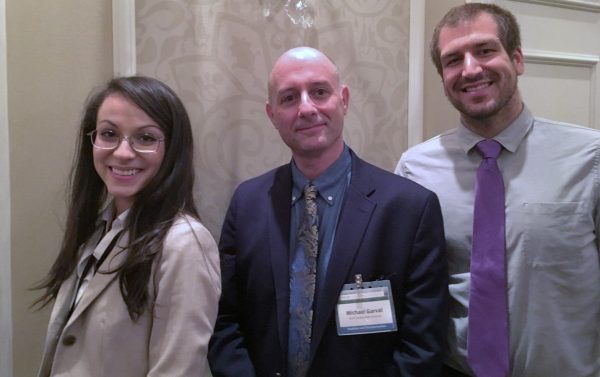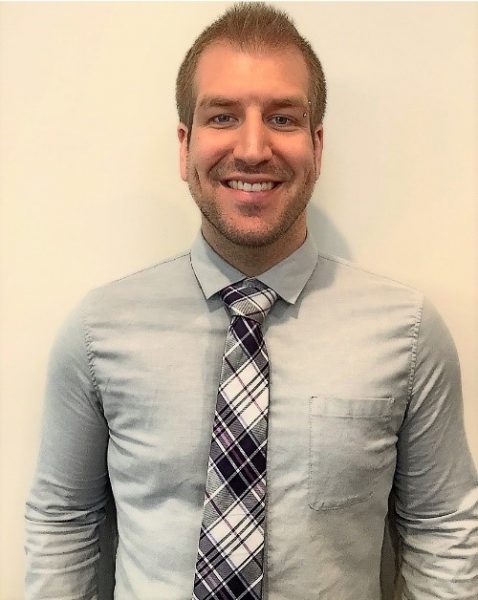Student Research: MALS students shine at the AGLSP Conference in Oklahoma City

As members of the Association of Graduate Liberal Studies Programs (AGLSP), the NC State MALS Program annually participates in the Association of Graduate Liberal Studies Programs Conference. This year’s conference took place in Oklahoma City, Oklahoma and presentations from two current MALS students were accepted. Maria Tudela (’17) and Austin Haigler (’17) both gave outstanding presentations at the AGLSP Conference and gained invaluable experience which will help them while in the program and beyond. Maria and Austin were gracious enough to give us an interview and share a little more about themselves and the experience.
 Maria Tudela
Maria Tudela
Maria is originally from Asheville, North Carolina and decided to come to NC State because she enjoyed the academic atmosphere. She felt as though studying here would provide her with the resources to grow as a student.
She received her Bachelor’s degree in Political Science from the University of North Carolina at Asheville in 2015. In the fall of that year, Maria joined the MALS program, with her research interests focusing primarily around women’s studies and feminist theory.
Maria decided to apply to the MALS program because of the interdisciplinary nature of the program. She was able to take classes in sociology, political science, women’s studies, and other disciplines as well. She stated that having the opportunity to create her own curriculum and take many different classes in distinct disciplines was incredibly enriching and challenging. MALS was the perfect fit for Maria for this reason and she was able to grow in her research and as a scholar because she chose classes that fit within the scope of her research.
Maria became interested in her area of research towards the end of her undergraduate career. As a political science major, she was aware of her political voice. However, it was not until Maria started the MALS program, and took classes in different disciplines, that she was able to dig deeper and locate that voice in spaces where she felt silenced. During her time in MALS, Maria’s research has become more specific and she continues to incorporate what she learns in different disciplines to think outside the box and to engage with scholarly material in creative ways. Maria said, “The interdisciplinarity of my academic work at the Masters level will definitely transfer to work that I anticipate doing at the doctoral level.” Maria believes that MALS has “enhanced her professional experience because I have had the opportunity to present my academic work! Last semester I presented at a conference in Oklahoma City and it was a great learning experience. I got feedback on my paper and was able to improve my ideas for my final thesis. My most recent conference was at UNC Chapel Hill where I was also able to receive helpful feedback on my work. Participating in conferences has given me both the confidence and humility to engage with scholars from all different disciplines.”
Austin Haigler
“Growing up,” Austin explains, “my zip code was associated with the city of Monroe, North Carolina, about 30 minutes outside of Charlotte, NC. Though technically I lived about 20 minutes outside of Monroe on farmland that my father’s side of the family had lived and worked on since 1811. However, my mother’s side of the family was essentially from the city, so one half of my upbringing was decidedly rural, the other half urban. I didn’t see this at the time but looking back it laid a foundational framework for coming to understand social concepts such as intersectionality theory or Dubois’s ‘double consciousness.’”
Austin would love to say that academics brought him to where he is now but that is not the case. While he was motivated to attend college regardless, wrestling brought him to NC State. He says, “I wrestled with the Wolfpack for three years before having my career cut short by a year due to two knee surgeries and a few concussions. I wanted to stay in North Carolina to be an example to other NC high school wrestlers and show that you didn’t have to go to Iowa, Oklahoma State, or Penn State to be an All American. Ultimately, I couldn’t bring that to fruition but now the NC State Wrestling team is consistently in the Top Ten in the NCAA so I like to think I played a very small role in helping the program grow to its potential, even if it happened after my time was finished.”
Austin’s academic background is in political science and political theory, the latter of which was his concentration in his baccalaureate work. He always planned to attend law school after finishing undergrad, but during his final semester, he became disenchanted with this prospect. He decided that there were more questions he had about the world, which would remain uncovered if he didn’t alter the intellectual path he was on.
At this point, Austin was at a loss for what his next move would be: “I wanted to further my education, especially since wrestling had taken up so much time and energy during my first four years, but I was at a loss as to what field I wanted to go into. Political Science was the most obvious choice, but I felt the most impactful courses I had taken up until that point were in Philosophy, Communication, and Sociology, so I looked to see what type of programs existed that combined elements from as many of them as possible. After doing a fair amount of searching around the nation, I found that Wake Forest, Duke and NC State all had MALS programs that seemed like a place I could start working out which field I ultimately wanted to go into by getting a taste of what each discipline had to offer in terms of graduate study. Wake Forest was my initial choice as one of my best friends was in medical school there, but the prospect of getting to work with some of my former professors at State, plus Michael Garval’s willingness to help me sort out my baggage from the outset was what kept me with the Wolfpack for my graduate work. The MALS program, without sounding cheesy or overly zealous, has been a better fit than I could have ever imagined. Without getting further into the weeds, intellectually speaking, I hardly recognize the person I was when I entered the program in May 2014. Each course I have taken, MALS seminars and otherwise, have contributed to an all-encompassing process of questioning my preconceived, presumed, and intuitive notions about the social processes that guide our group interactions and thinking, the implicit cognitive biases that guide our person to person/moment to moment interactions, as well as the disciplinary boundaries that catalog and code how we as humans generate different types of knowledge claims and critical lenses for examining the world. If one were to ask me a question pertaining to any of these topics, I would give a wholly different answer in May 2017 than in May 2014. At the core, I have my MALS work to credit for that transformation.”
When asked why he became interested in his area of study and how he will be applying interdisciplinarity in his academic and professional work, Austin says, “The blessing/curse of my academic journey has been narrowing down on what fields of study I want to gain expert knowledge in. I always look for a point of inquiry that has the potential to comment on as many disciplines as possible, has practical social and cultural relevance, and is untouched by loads of scholars. To me, that is where the action is, so to speak. I started off my MALS journey with the intent to segue into a PhD in Food and Environmental Sociology (State has a particularly good program). But upon taking Michael Garval’s own MALS Seminar, Food for Thought, which is a mixture of sociology, food studies, history, and cultural studies (what I like to refer to as ‘Food Philosophy’) I found that I was interested in the intersection between how humans used food stuffs not only as sources of physical nourishment, but as large scale commodities that sometimes laid the groundwork for a globalized economy, and the basis for many spiritual and religious schools of thought. The notion that spiritual/religious experience had potential chemical neurological underpinnings that could be traced back to the ingestion of psychoactive plants and fungi — that also existed as foodstuffs and or commodities — was revelatory to me. When I looked for academic information about this relationship, I found that the majority of research was investigating ‘other’ cultures, i.e., not white and Western cultures. I have spent the last three years finding, reading, and analyzing all the academic books that have been written about Western culture’s relationship with psychoactive substances, and especially the class referred to as ‘psychedelics,’ since no other class of drugs has garnered the multifaceted reputation in the West as those that are deemed “mind-expanding.” Given that the academic research into psychedelics thus far has come out of departments as varied as Philosophy and Religious Studies, Psychology, Anthropology, Pharmacology, Musicology and History, interdisciplinarity is not so much an option, but a requirement, as a critical lens for my work.”
Austin also praises the preparation MALS has afforded him. While finding funding as a graduate student in the Humanities has been a challenge, Austin has had a number of opportunities. He has worked as a Teaching Assistant and as a Research Assistant (which led to his first publication) and traveled to academic conferences such as the Association of Graduate Liberal Studies Programs 2016 Annual Conference, hosted by the University of Oklahoma. Austin remarks, “attending that with Michael Garval and María Tudela was a substantially beneficial experience because I had the opportunity to present my work to a variety of scholars — young and old, from around the United States — get feedback, experience the anxiety-inducing Q & A session, and interact with others who are on similar academic and professional paths. Interdisciplinary work is by nature open ended, less structured and more free form. This can be its biggest blessing and its biggest curse, as one can find a truly stimulating object of inquiry, but sometimes be forced to work in relative isolation. Getting the full immersion into what MALS can offer, including conferencing, allows you to see how your interests can align and intersect with the variety of unique topics being engaged by scholars around the US and abroad.”